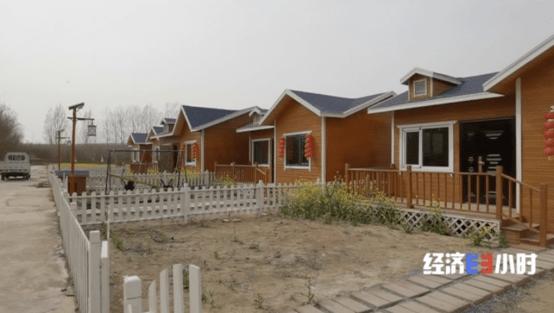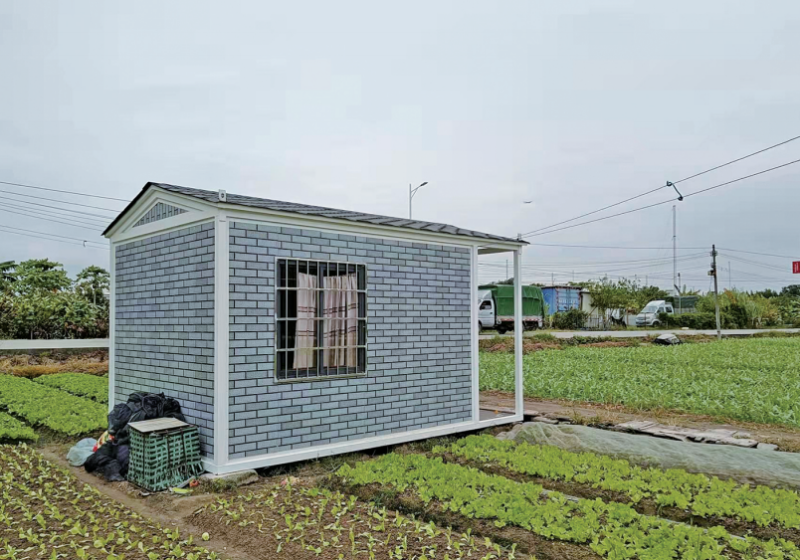A crackdown on vacation homes disguised as greenhouses reveals China's clashing priorities: leaders say they want farm-related tourism to pump money into the countryside, but most of the land can only be used to grow crops that pay farmers a pittance.
Last week China's Agriculture and Natural Resources ministries jointly published a list of cases where rural villas and vacation homes were disguised as farming structures. These have been demolished and reclaimed as farmland since authorities launched a campaign against such projects 4 years ago (see this blog's September 2018 post on greenhouse villas). The projects skirt strict zoning of rural land for agriculture by building hotels, teahouses and villas inside giant greenhouses or by disguising vacation cabins as sheds for field laborers. With scarce land and robust demand for bucolic vacations and getaways in the countryside, the projects are an easy way for rural villages to earn money.
 |
| Vacation cabins illegally built on farmland in Shanxi Province's Linfen City discovered in 2021. Source: Economy Half-hour. |
The two ministries published the list of six illegal projects to warn local officials of the "zero tolerance" for illegally changing the use of land zoned for farming, and demonstrated the two ministries' resolve to investigate and punish those who fail to comply. The crackdown is part of Xi Jinping's orders to prevent the loss of farmland.
The list included projects that began as long ago as 2008 and two that were discovered in 2021, including a development of 8 fenced cabins for rent or sale in a Shanxi Province village and an ecological agriculture company in Fujian that had illegally built 4 cabins, a parking lot, wood plank road, and 3 wooden rest halls. A project in Heilongjiang's "Love the People" District built 18 of 158 greenhouses on "permanent farmland" and rented them out to vacationers. The Heilongjiang project had been remediated by officials in 2019, but renters had carried out renovations since then that prompted another intervention by officials.
 |
| Rental cabin hidden inside an agricultural hothouse. |
The Fujian project used less than an acre of cropland for constructing the illegal cabins, while a project in Henan Province involved about 74 acres. The perpetrators were rural agricultural companies and agricultural industrial parks run by villages and townships. Several of the projects were raided by carloads of officials. The perpetrators were punished with self-criticisms, party warnings, and fines.
The crackdown on rural vacation cabins clashes with initiatives to integrate the rural and urban economies and to beautify the countryside. Rural officials are urged to promote the rural tourism industry, but strict land-use zoning limits the supply of land that can be used for such projects.
A 2019 essay by a greenhouse-building company attributed the persistence of the "greenhouse problem" to pursuit of "short-term gain" by farmers and rural officials. Farmers frustrated by low earnings from farming see an opportunity to make money from their land by fulfilling city peoples' "country house dream," the essay explained. The essay observed that farmers often exploit regulations allowing greenhouses to contain extra rooms to house workers by turning those rooms into hostels and rental houses for vacationers. The essay claimed that the long-term interests of maintaining farmland for food security outweigh the short-term interests of farmers and rural officials actually profiting from the land.
The conflict comes into clear focus in a pilot program to build upgraded sheds in agricultural fields launched in 2018--same year as the crackdown on "greenhouse villas"--in the Baiyun District on the outskirts of Guangzhou. The project's aim is to build modernized structures to replace crude shacks haphazardly constructed from corrugated steel, plastic sheeting, bamboo and other materials to house workers in farm fields and store tools. Authorities say they have built over 5000 new farm sheds in the last 3 years. The aim is to standardize the sheds, clean up trash, prevent damage to farmland and improve rural scenery.
 |
| Upgraded field sheds look a lot like vacation cabins. Source: Baiyun District. |
The new farm sheds in Baiyun District look quite a bit like the illegal vacation cabins built by the illegal projects described above, and it's not hard to imagine a project to construct such farm sheds on the outskirts of a wealthy city morphing into another disguised rural tourism development venture (funded with subsidies for the "pilot" project).
Baiyun officials ordered village and town leaders to use the new sheds only for agriculture, have zero tolerance for abandoned farmland, and not to change the use of land without approval. Village leaders were also instructed to clean up trash and waste in fields and roadsides, and were urged to promote agricultural tourism and leisure and "creative experience agriculture."
Not noted by the greenhouse designer's essay cited above is that farmers who control the land (temporarily) have no means of profiting from the "long-term interests." They cannot sell the land and can only mortgage it using the value of crops produced from the land.
This "food security" policy prevents farmers from reaping the full commercial value of their land and prevents city people from achieving their "country house dream."



No comments:
Post a Comment